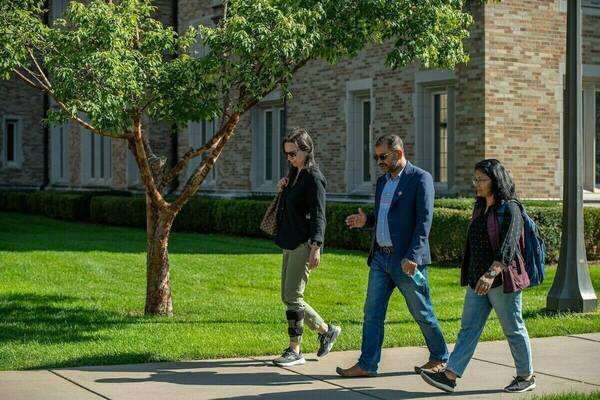The Institute for Educational Initiatives at Notre Dame Launches Free Math App to Help Teachers Strengthen Students’ Understanding of Numbers and Operations
The Number Sense Assessment app gives educators quick, research-based insights to target instruction and improve student outcomes
Notre Dame, IN — Researchers at the Institute for Educational Initiatives at the University of Notre Dame have launched the Number Sense Assessment, a free, research-based math app that helps teachers in grades 3 and up quickly identify gaps in student understanding and strengthen instruction in core math concepts.
Backed by a $496,337 grant from the National Science Foundation and developed in collaboration with the Lucy Family Institute for Data & Society, the assessment has already been used in more than 25 schools, reaching over 2,000 students. It is also being implemented in ACE Teaching Fellows partner schools and through Tutor-ND.
The app reflects years of research on mathematical cognition and offers an easy, practical way for teachers to boost math understanding—right from their classrooms.
“The teachers and math educators we work with all tell us how important developing their students’ number sense is. However, they haven’t been able to efficiently see if their students are making any progress towards that goal,” said Patrick Kirkland, Assistant Professor of the Practice in the Institute for Educational Initiatives and lead developer of the app. “The Number Sense Assessment addresses that gap—and gives educators actionable insights, at no cost, without adding to their already full plates.”
Designed for real-world use, the app takes just 10 minutes to administer and provides immediate feedback. It presents students in grades 3rd grade and up with mental math tasks that measure not just computational skills, but deep conceptual understanding and flexibility with rational numbers and operations. Teachers receive easy-to-read reports highlighting student strengths, misconceptions, and next steps—along with access to research-backed instructional resources.
A recent article from The Hechinger Report (“The Building Blocks of Math That Students Need to Excel”) underscores the growing importance of number sense in setting students up for long-term success in math.
“We’re proud to support this collaboration, which brings together interdisciplinary research and real classroom impact,” said Nitesh Chawla, Founding Director of the Lucy Family Institute for Data & Society. “The Number Sense Assessment app reflects how data-informed tools can empower educators and expand opportunity—especially for students who may otherwise struggle in silence.”
Whether used at the beginning of the year, mid-semester, or as part of summer learning, the app helps teachers tailor instruction to student needs with minimal onboarding, no extra materials, and zero cost.
The Number Sense Assessment app is now freely available to educators nationwide at: numbersense.nd.edu
About the Lucy Family Institute for Data & Society
Guided by Notre Dame’s Mission, the Lucy Family Institute adventurously collaborates on advancing data-driven and artificial intelligence (AI) convergence research, translational solutions, and education to ethically address society’s vexing problems. As an innovative nexus of academia, industry, and the public, the Institute also fosters data science and AI access to strengthen diverse and inclusive capacity building within communities.
Learn more at lucyinstitute.nd.edu.
About the Institute for Educational Initiatives (IEI)
Founded in 1996, the Institute for Educational Initiatives (IEI) at the University of Notre Dame is home to more than two dozen programs that strive to improve education for all children—particularly those historically underserved. Through teaching, research, and outreach, IEI forms educators and scholars who support human dignity and advance the common good. Anchored in the values of Notre Dame, IEI pays special—but not exclusive—attention to Catholic schools as engines of academic excellence and integral human formation.
Learn more at iei.nd.edu.
Latest Research
- Crossing borders with NDG grants: Engineering professor brings his research—and passion for fruit flies—to MexicoOfficially, Jeremiah Zartman studies and teaches about human health as an associate professor of chemical and biomolecular engineering at Notre Dame. Unofficially, he’s a passionate advocate for fruit flies. His fascination began during his time at Princeton, where Notre Dame alumnus and Nobel Prize…
- To prevent deliveries from disappearing from porches, Napoleon Suarez ’04 thinks outside the box.…
- No credit history? You might have another way to prove creditworthinessNew research from Notre Dame marketing professor Joonhyuk Yang reveals how retail transaction data can be used to create reliable credit scores for individuals without formal credit histories.
- Twenty-two Notre Dame students selected for 2025-26 Fulbright U.S. Student ProgramTwenty-two University of Notre Dame students have been named finalists for the 2025-26 Fulbright U.S. Student Program, with another seven singled out as alternates for the award. The finalists include 18 undergraduate students and four graduate students.
- From Notre Dame to Nepal: Notre Dame’s Research Communications Lead Builds New Collaborations with Kathmandu UniversityWith over 7,000 miles between them, the University of Notre Dame and Kathmandu University (KU) in Nepal stand a world apart, geographically. Take a closer look, though, and you will notice a few surprising similarities. Both are situated in and around sacred spaces…
- NDISC Students Study the American Revolution and Modern Navy with ROTC and Naval Academy Cadets and MidshipmenIn the second iteration of the Notre Dame-Naval Academy collaborative staff ride, students and staff participated in a two-week series of historic site visits and character presentations centered around the American Revolutionary War as well as visited modern military facilities to gain a better understanding of the various Navy communities and broader military joint capabilities.













